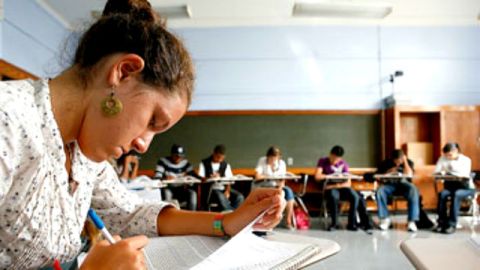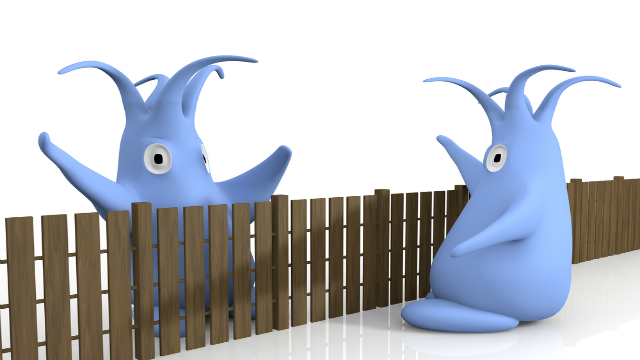Kant & Cryptology at 16: Thoughts on “Academically Adrift”

Today as I meditate on Arum and Roksa’s much-discussed study, “Academically Adrift: Limited Learning on College Campuses,” my thoughts turn to academic life at the institution where I teach.
This week in my colleague’s advanced Latin class, students are reading Exodus in the Vulgate and hunting for contrasts between its prose style and those of other Classical texts; discussion often turns to archaic stories of creation and relationship to the divine students are studying in a core humanities seminar. A Cryptology course is considering elementary matrix theory and applying it to diagraphic ciphers. In a course on practical ethics, students are asking how reproductive technology, economics and no-fault divorce are changing how people regard the institution of marriage. And in twenty independent studies this spring, students are investigating everything from black masculinity in African American literature and the Riemann Mapping Theorem to the history of public housing and cancer cell biology.
Everyone is gearing up for an end-of-the-year Symposium Day when, on the model of an academic conference, students will present and critique one another’s research in dozens of panels, lectures and roundtables.
In contrast to this picture, Arum and Roksa’s recent study highlights many American universities’ apparent failure to fulfill their most basic mission: educating students. Based on surveys of over 2,300 students at a range of institutions, the first two years of college don’t seem quite worth the $100,000-plus investment: 45 percent of students “did not demonstrate any significant improvement in learning” in their first four semesters.
What is to be done? Arum and Roksa propose that colleges adopt more rigorous curricula, place less emphasis on “social engagement” (sports, a cappella groups, fraternity parties) in favor of more opportunities for academic engagement, and develop better internal assessments of how much and how well students are learning.
These are all good ideas. Based on my experience at Bard High School Early College (BHSEC) in Manhattan, I would suggest two keys lie in treating faculty members as professionals and treating students as young scholars.
Before I expand on these ideas, a word about BHSEC. A decade ago, Bard College joined with the New York City Department of Education to open the first public early college in the country. It has since established two more BHSECs in the New York City area: the Queens campus opened in 2008, and a new branch in Newark launched in 2011. The guiding idea — which President Obama has hailed as an “innovative approach” in public education — is that many students can profit from engagement with college-level inquiry at a younger age. BHSEC students complete high school courses in the first two years and then jump into college work, earning 60 college credits and an associate of arts degree. Students then transfer to a traditional four-year college or university to complete their undergraduate education. Similar programs now exist in New Orleans and Delano, California and are modelled on Bard’s private early college at Simon’s Rock.
I often marvel at what students of this age can do. I certainly wasn’t reading Plato’s “Republic” or developing syllabi for independent studies on electromagnetism or “gene expression and chemoresistance in acute myeloid leukemia” in high school. How is this possible? In part, it’s about the students we accept to the program. Admission is based on middle school grades, in-house essay and math assessments (not standardized tests) and an interview, and results in a motivated, broadly diverse student body. But BHSEC does not aim to be, and isn’t, a Mensa society. The school seeks out students who are excited to engage in the liberal arts at an earlier age, period. What makes this work? What lessons can colleges and high schools draw from BHSEC’s success?
(1) Treat faculty members as professionals and challenge them.
Whatever they are teaching, faculty must bring an engaged spirit of inquiry to the classroom if they want to cultivate this spirit in their students. Unfortunately, the trend in K-12 schooling is exactly in the opposite direction. Rather than trust teachers and afford them autonomy to develop their own curricula and lesson plans, education systems love to micromanage. A comment from “Hypatia501” on my post last Thursday on what teachers can do about standardized testing captures this idea:
Stepping back from the free speech issue, we need to consider where the obsession with quantifiable outcomes arises. It arises because teachers are not trusted as professionals. And they are not trusted as professionals because the conditions of teaching have been rigged to drive out many of the people who have the talent to function as professionals. The more dumbed-down teaching is made — “teacher proof” textbooks, lesson plans prescribed down to the last syllable and minute of class time, workbooks for every exercise, etc. — the less talented people want to go into K-12 teaching. And then because the talent pool is so shallow outcomes aren’t great and people figure it’s time to Taylorize teaching even more. Many of the problems with education are thereby iatrogenic — products of the very procedures put into place to solve those problems. Replace professionalism and trust with micromanagement and constant monitoring and see what you get.
At the BHSECs, teachers work in teams to develop curricula and assignments for core courses like 10th grade global history or the four-semester college seminar sequence, and are free to develop and teach college electives independently. We always develop our own lesson plans, free of interference. We have the support and respect of the administration to organize our classes the way we think they will work best.
Being personally invested in the material doesn’t mean teachers must always be experts in what they’re teaching; this semester in a humanities seminar I’m teaching “Don Giovanni” and “Pride and Prejudice,” exploring the opera and novel for the first time along with my students. At many small colleges, professors are asked to stretch themselves beyond their areas of expertise, and at St. John’s College dragging faculty outside their comfort zones is part of the educational philosophy. Without new challenges, even the best teachers will start to lose their edge after a few years. And as humbling as it may be for a political scientist to teach opera, the students get the message that they can tackle anything, too.
(2) Treat students as young scholars.
After spending their elementary and middle school years preparing and sitting for standardized exams, students are well practiced at coming up with answers to test companies’ questions. They are not much in the habit of asking their own questions or developing their own perspectives on the issues of the day.
To instill the fundamental attribute of a scholar — curiosity — both secondary schools and colleges should provide more room for students to ask questions about texts, devise inquiry-based projects and engage in debate with one another. One way many Bard institutions do this is through a year-opening Language and Thinking workshop during which students spend a week or more writing about and discussing diverse short texts — poetry, short stories, classical texts, excerpts from works of philosophy. In the workshop everyone, including the instructor, composes short responses to the texts as preludes to discussion.
This type of activity in class is foreign to most high school and college classrooms, where students are typically expected to absorb information by listening to a lecture or perform by offering a comment in a discussion based on insights gleaned in the library. But the best classrooms ask students to work while in class: to grapple with difficult questions in real time and to develop knowledge in conversation with other students.
Beyond cultivating a love for big ideas, both high schools and colleges need to do more to familiarize students with the scholarly tools they’ll need for real inquiry including hands-on training in research techniques and scaffolded research paper assignments.
As Arum and Roksa write, “the future of a democratic society depends upon educating a generation of young adults who can think critically, reason deeply, and communicate effectively” (31). At both the high school and college levels, we can do better.
Follow Steven Mazie on Twitter: @stevenmazie





